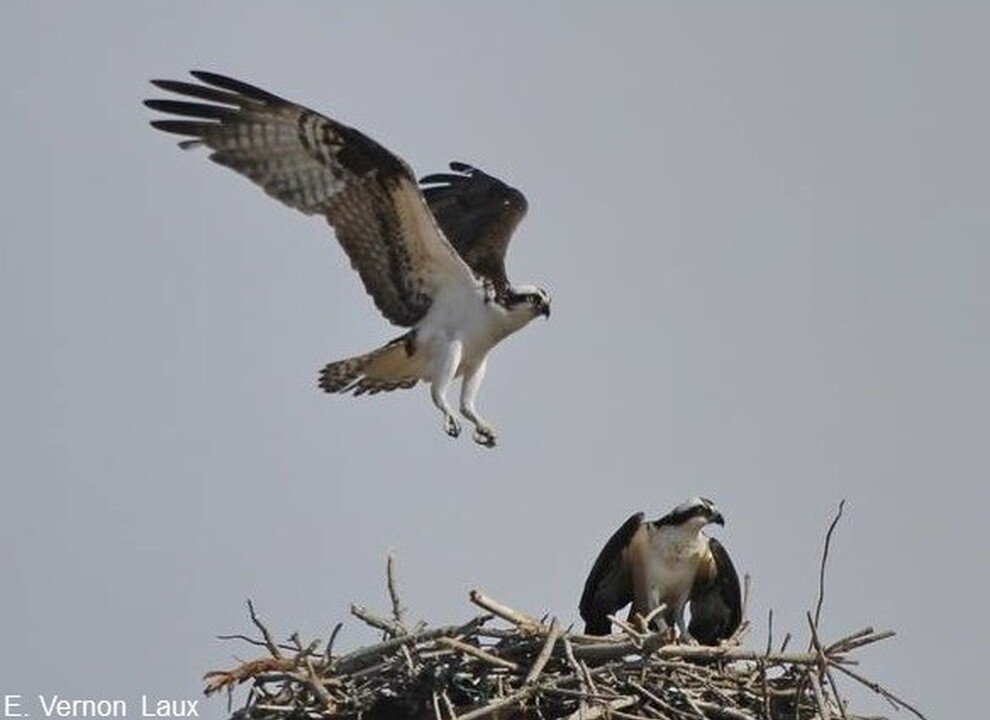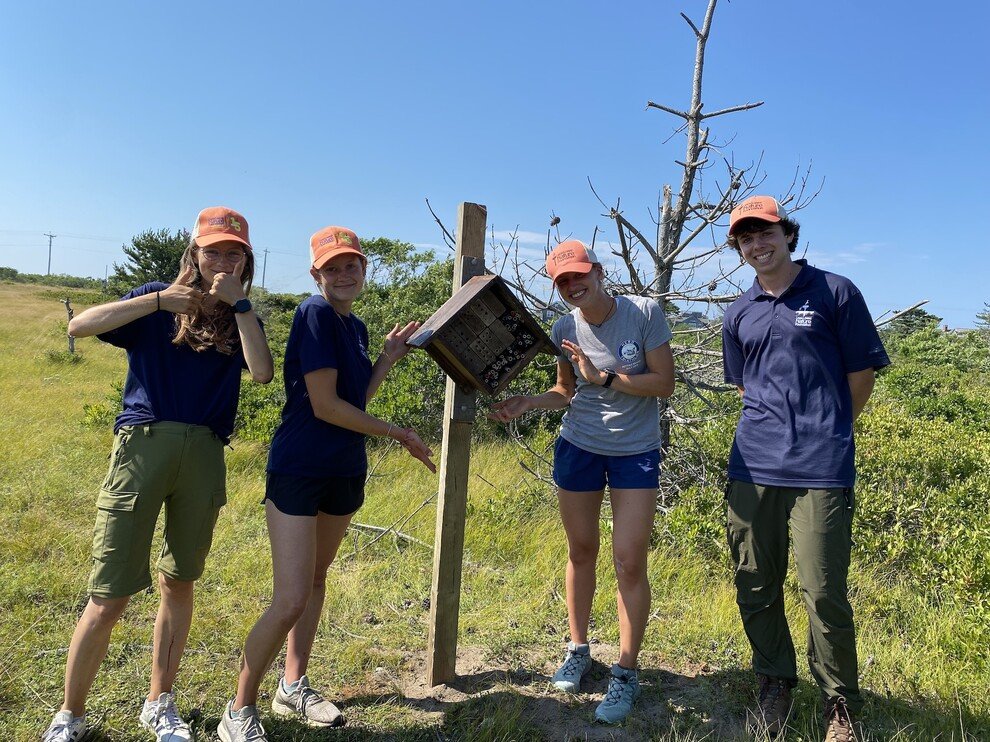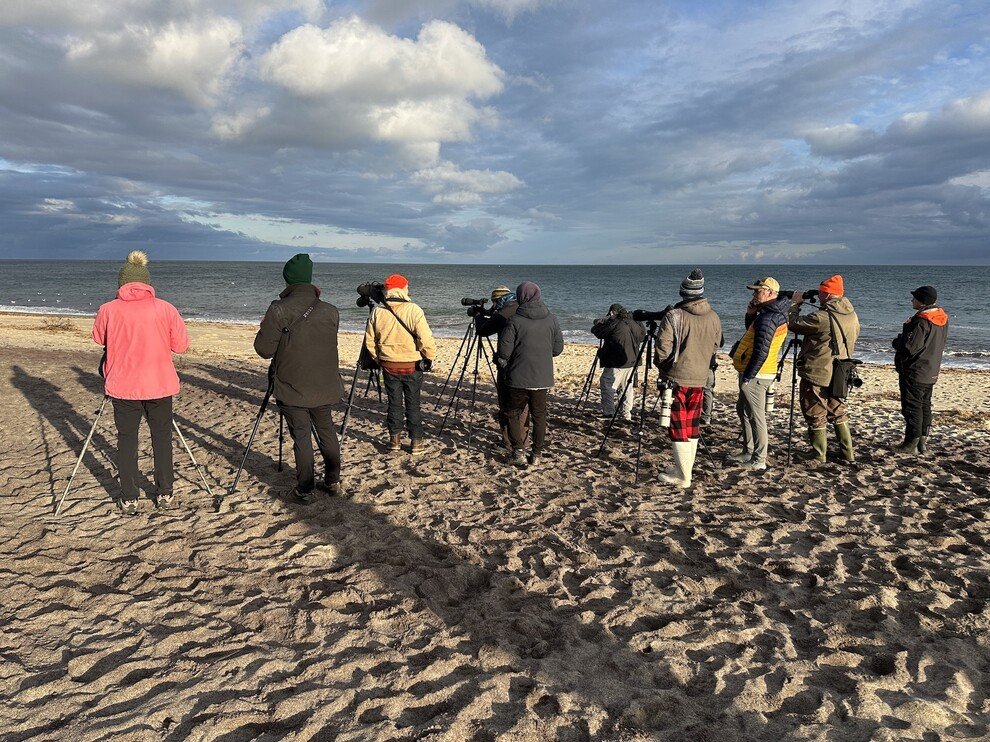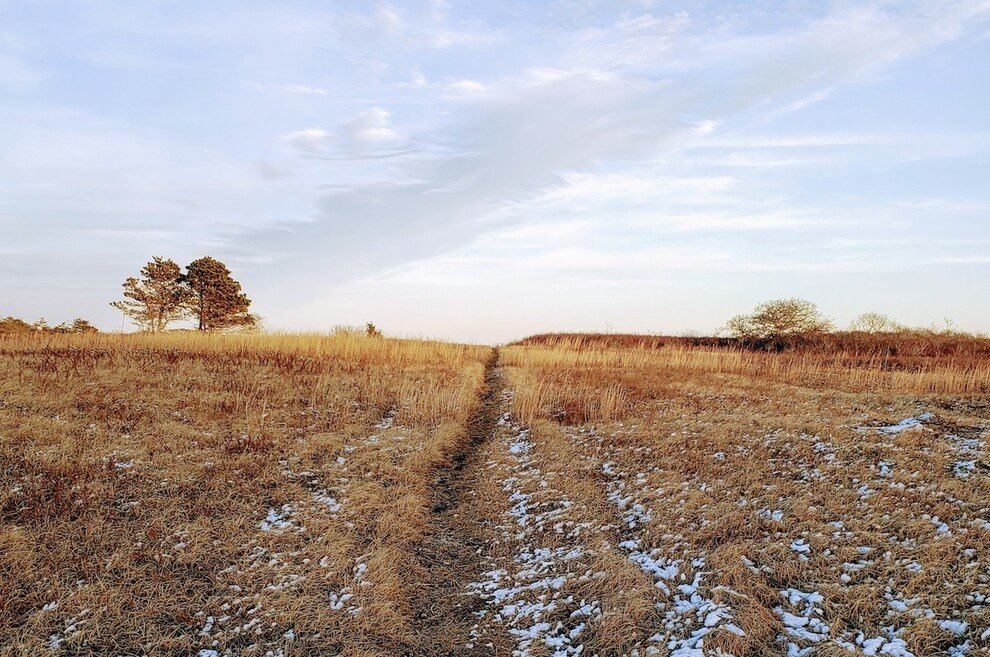
Current Nature: Phenology Fun
Kristin Bullett, Community Engagement Coordinator, Linda Loring Nature Foundation • Apr 01, 2024
Unlike most plants, Beach Plum flowers before leaf buds appear, a unique phenological display.
Spring has arrived, just in time for National Phenology Week! Spring is a great time of year to dive into phenology, which is the study of the timing and patterns of events in the natural world, like the annual life cycles of plants, animals, and other living things. These events include the budding of leaves, the arrival of migratory birds, the flowering of plants, and the onset of fruit ripening. Phenology is a vital field of ecological research that helps us understand how organisms respond to environmental cues such as day length, temperature, and rainfall, and how climate change can impact these seasonal changes.
Here on Nantucket, we look to specific signs that spring is here. One very audible sign is the calling of Spring Peepers, which has begun in the last week or so. Many of us look forward to blooming daffodils to signal winter’s end, and the Osprey’s arrival tells us spring is here. Studying and tracking these everyday events can tell us a lot about the environment and how it is changing.
Phenology is a key part of the research we do at Linda Loring Nature Foundation. Across our 275-acre property, eight sites are monitored for changes in native shrubs like Black Cherry, Bayberry, and Scrub Oak. These sites also have temperature sensors so we can record that data along with when plants are budding, fruiting, and shedding leaves. LLNF has collected a decade’s worth of data on the phenology of native species on our property, which serves as a baseline for tracking environmental changes. We can compare data across different years to get a big-picture look at what’s happening with these plants.
These cherries are beginning to leaf out. This photo was from May 20th 2023, and could be used to compare the phenophase of the same trees on May 20th this year.
You might be wondering, “What’s the big deal? Who cares when a Black Cherry flowers?”, but remember that everything in nature is connected. If a plant’s flowers bloom early, then they will form fruit early. Insects that depend on the flower’s nectar will emerge at the “usual” time, and be left without a food source because the flowers have come and gone already. And the plant will miss out on the pollination from these insects, too. When a mismatch in phenology occurs, the ripple effect on the food web can impact a species’ survival.
LLNF’s research is part of the National Phenology Network, an organization that collects, organizes, and shares phenological data to create a broad understanding of phenology. This data is essential for researchers, policymakers, and land managers to make decisions that affect our environment. You can follow along with us and NPN to learn more about phenology. LLNF was honored to be selected as the 2023 PhenoChampions by NPN, an award that was just recently presented in March during National Phenology Week!
Phenology research is a great outlet for Community, or Citizen, Science. When the public contributes information to a scientific project, that’s what we call Community Science. Community Science projects have volunteers who work alongside scientists to collect and manage data for real-world research projects. Dozens of volunteers (students and adults alike) have contributed to our phenology research. All you need is a notebook, a pen, and a keen eye! We look closely at buds, flowers, and fruit to determine exactly what “phenophase” a plant is in. You can also discover phenology in your yard or garden- which you may be doing already without realizing it! This spring, jot down the date your crocuses popped up, or when the lilac bush formed buds. Phenology is a fun way to become more connected to the natural world and appreciate the small changes happening every day.
Stay tuned for more editions of Current Nature, a biweekly column from the Linda Loring Nature Foundation featuring seasonal topics, natural history information, and advice on the outdoors!
This Black Cherry’s leaf buds have begun to open. Look closely for these changes in the plants around you!
Current Nature: Migration Marvels
In the next few weeks, the first seasonal residents will return to Nantucket. No, not mainlanders- migratory birds! The majority of birds that we see on Nantucket spend the winter elsewhere, either somewhere very warm or very cold depending on the bird. Soon a trickle of songbirds and shorebirds will arrive, beginning another spring nesting season.
Current Nature: Be A Bird Buddy!
In today’s age of modern technology, there are more options than ever to learn about birds in your own backyard. One of the coolest items to recently hit the market is the Bird Buddy, a compact bird-feeder that takes pictures of the birds that visit, identifies them for you and sends the photo directly to an app on your smartphone.
Current Nature: Bee Hotels to Keep Your Pollinators Cozy
At the Linda Loring Nature Foundation, one of our volunteers, Tessa Husted, made it her mission to help out the solitary bees in need and created a Pollinator Hideout. A Pollinator Hideout is a specially designed space that provides shelter and protection for bees during the winter. These hideouts come in various forms, from simple garden structures to more elaborate bee hotels. The goal is to create a welcoming and safe space where bees can find a barrier against the biting winds and freezing temperatures.
Current Nature: Visualizing Five Years Of Habitat Restoration And Pine Removal
The Linda Loring Nature Foundation (LLNF) launches a new visualization tool highlighting 5 years of grassland restoration work through invasive Japanese Black Pine removal. This LLNF Story Map is a communication tool that illustrates the goals and outcomes of a project using maps, photos, and data.
2023 Nantucket Christmas Bird Count Results
The National Audubon Society was celebrating the 124th year of the Christmas Bird Count program this year, and it was Nantucket’s 69th year of participating in it.
From the preliminary results, we counted 128 species and 83,626 individual birds. The rare species sightings included an Eared Grebe, Western Tanager, Lark Sparrow, Blue-headed Vireo, Common Gull (Kamchatka), Lincoln Sparrow, Painted Bunting, Common Gallinule, Tufted Duck, and Sedge Wren.
Current Nature: Year-End Nature To-Do List On Nantucket
We still have a few days of school vacation left, and the weather looks pretty favorable for an outdoor adventure. Check out a few ways you can get outside and enjoy some fresh air on Nantucket before the year’s end.
Current Nature: Solstice Surprises
We are approaching the Winter Solstice, the shortest day and the earliest sunset of the year. Although people tend to think of the solstice as a day, the actual event is just a fleeting moment when the Earth is tilted as far away from the Sun on its axis as possible. In the Northern Hemisphere, this will happen on Thursday, December 21st, 2023 at 10:27 pm, and will mark the start of Winter in the astronomical calendar. The good news is that after the solstice, days start getting longer again and sunsets will occur later.








